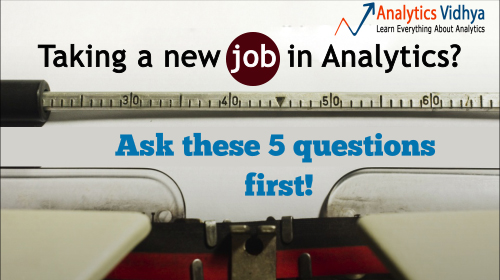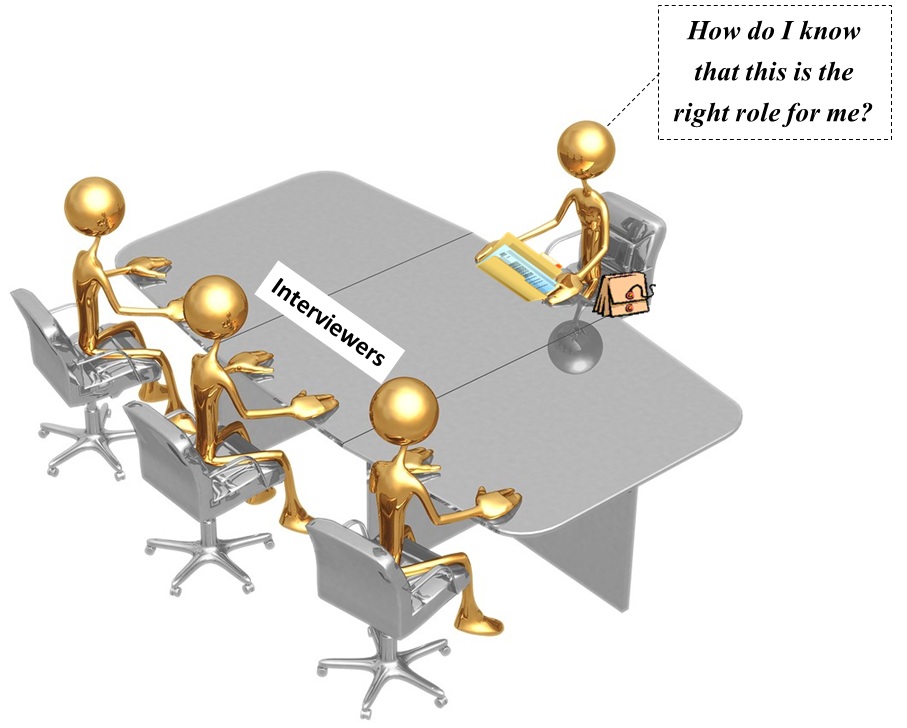Taking up the right job can accelerate your career.
On the other hand, getting into a wrong job can de-rail you for couple of years. The impact of these decisions can be far higher than what it might look getting into the job. Please note, by right job, I simply mean it is right fit with your goals (of making a career in Analytics industry). Similarly wrong job means bad fit with your goals.
Let me take an example to explain what I am saying:
While I was lucky to get into Capital One from campus placements, many of my friends were not that lucky. One such friend was Mehul (name changed). Since he could not get into Capital One, he took up job from another MNC with designation as Analyst.
A few days in his job and the truth dawned up on him. He realized that his role was part of IT team. He was expected to write queries for business requirements, check system maintenance and perform pre-defined reporting for business. The word analysis was completely missing in the way he described his job! He still decided to stay for at least 12 months before making a switch.
After those 12 months, he has made several attempts to enter Analytics industry, but haven’t got a break through till date. Today companies mention lack of hands on Analytics experience as the major reason for not considering him! Sad! but this is a reality check for people who are taking up jobs in hope of becoming an analytics rockstar in their career.
In order to make sure that people make right choices with the roles, I have come up with a list of questions, which you should ask to your employer before taking up a job in Analytics. The aim of these questions is to make sure you know what you are getting into. I assume that you would use this in addition to the research you are doing any way (rather than in isolation). For example, I have not included questions asking for “Stability / History of the company”. I am assuming, you will do that at your end.
I think that using these questions will not only help you make the right choice, it will also tell the employer that you are dead serious about the role and industry! So here is the list of questions:
[stextbox id=”section”]1. What is expected out of the role – Analysis or reporting?[/stextbox]
You need to find out the expectation from the role. There can be various levels of expectation from a role (in order of increasing value addition):
- Creating business reports (pre- determined format) or refreshing dashboards with right data.
- Creating business report, looking at trends and providing a commentary (Note: I mention looking at trends and not Analyzing)
- Taking up a project (business problem), creating framework to analyze data, collate various hypothesis, mining data for insights and giving them to business
- Along with what is mentioned in previous point, owning the project implementation.
All these positions will be called Analysts! However, the learning in the last role would be far higher than the first one.
So, how do you find the expectation from the role?
Your first step is to read the Job description thoroughly and map the job on Business Analytics spectrum. If you are still not clear, asking these questions from the interviewer can help:
- Please describe typical day for this role? What kind of problems will I work on day to day basis?
- What is the impact this role can create in the company?
- Who are the main customers (internal / external) for the role / team?
These should leave you with enough details to map the role correctly. If you are still not clear, next point might help.
[stextbox id=”section”]2. Ask for a recent project done be person in the role:[/stextbox]
You should ask the interviewer to describe work done by the person in this role recently. This should give you a good flavor of the work which is expected out of the person. Following are the aspects you should specifically understand:
- How critical was the problem to the business? Was it creation of a report? Creation of a monitoring platform? or Segmenting the entire customer base to create strategy for the company?
- What kind of tools and techniques were used during the project? What was required – a complex data modeling? Clustering? Predictive modeling?
- What were the quality of insights that came out of the project? How much impact did the project create? Was the benefit monitored?
- If it was a strategic project, did the company test it before implementing it completely? Good companies will test out the insights before implementing them.
[stextbox id=”section”]3. How big is the analyst community? Can you talk to them? Do you know some one?[/stextbox]
Answer to this question would help you understand following:
- How much peer to peer learning can happen? Usually analytics is best learned through brainstorming with other analysts on the job.
- The perspective your customer and leadership would have towards analytics. The bigger the community, higher would be the mind-space in Leadership team
If you can connect to analysts in the company, that would help immensely.
[stextbox id=”section”]4. Which function does the position / team report to?[/stextbox]
While there might be exceptions to this, but the reporting function usually influences the kind of projects you work on. If the team reports to IT, the nature of projects would focus more on tools and dashboards (rather than customer insights). If it reports to Operations, you might get higher share of Operations Analytics. Typically, direct reporting of Analytics team to the CEO (or through Center of Excellence) brings the best mix of the problems.
[stextbox id=”section”]5. If it is replacement hiring, why did the last person leave?[/stextbox]
This is a tricky question and you have to judge the right way and moment to ask this. An informal lunch / coffee post interview might be more suited than during the interview. But, asking this question might give you some good insights:
- Is the manager / interviewer comfortable while talking about it? If he is, he is likely to be comfortable having open and honest discussions later on.
- Does the reason sound reasonable? How did the Organization react to it? If the person left for higher education or starting his own venture, did he / she get the required support? If the answer does not convince you, do not ask further, but try and understand it later on.
[stextbox id=”section”]5. If it is a new team / setup, what is the vision / goals for the team?[/stextbox]
For new setups, it is always worth understanding the vision / goals for the team. If the person is not clear about them or is unable to articulate it, consider it as Red flag. If the leader can’t articulate / excite a new team member about the team’s vision, chances that the team would be clear / excited about their role and responsibilities are bleak.
Asking these questions should give you a good read on fit between your expectation and interviewers expectation. You should only join the potential employer when you get satisfactory answers to at least 4 of these questions (with full match on the first question.)
If you have any thoughts on these questions, or use any other questions to judge new roles, please add them in comments below.








Would like to start journey on analytics hence any guidance is appreciated
Sonu, The website contains various articles which might help. Have a look here or here Thanks Kunal
You are missing two key questions which should be asked up front............ 1. Please detail for me the shortcomings of your data aka systems, data cleanliness, personnel, and procedures.......If the hiring manager will not or cannot discuss that, it is time to move on. Dig deeper into what the organization has done or is doing to address the issues. The surest way to derail any sort of analytics are problems with data and no organization is going to have a perfect set of data. Be very wary of companies who promise everything is being looked after when NO RESOURCES are out there to address them.....Last, always remember...............When it is everyone's responsibility, it is no one's responsibility. 2. Ask the hiring manager what is the typical way which analytics projects and their results are handled. Ask what management has done with the results of a recent project......NOW MORE THAN EVER, with so much data and analysis flying around, many inexperienced and undisciplined management teams are frozen by paralysis by analysis..........Is management sitting around waiting for the magic bullet? Do things just end up in endless discussions and committee weekly meetings? Are analysts being asked to come up with more and more analysis so no one has to make a decision? Again if the hiring manager cannot or will not go into detail, it is time to move on.........
Geoffrey, Both the point are worth considering. On second point specifically, I think there is a broader point that at any point of time during the interview, if the hiring manager is not going in details and is keeping the discussion superficial, it might be flashing warning signal. Thanks, Kunal
Hi Guys, Input by both are genuine, but in ideal world is it possible.? Generally employer hides shortcomings never disclose bottleneck/ serious issues. In my view Analytics purely depended on clean data to achieve optimal result. Secondly job seeker would like to get a job in today's economical crunch. On other hand No manager would not like to hire someone, pose questions to interviewer. Thou Roles and Resposibilities are un-ending... Thanks, Zahiruddin Khazi
Zahiruddin, There are following points I would like to mention:
Purpose of the questions is to be aware of various pitfalls you can avoid before getting into a new role. You should know the answers to these questions before taking up a job. For example, a very common situation, which people face is that they end up taking reporting roles under the promise that there will be Analysis needed by the business. If this happens, you may end up with a job, but your growth will be slower. If you desperately need the job, you can still take the decision to join, but you will be aware what to expect in the role. Analytics depends on clean data to achieve optimal result, but the Organization has to be open to accept and talk about the challenges being faced in cleaning it up. If the hiring manager is reluctant to hire someone who is asking questions, one of you (either the person hiring or the one getting hired) is in wrong place. I would not take that job. Finally, the demand for talented people is very high and is set to increase further, which would provide people the opportunity to find the right fit.
Thanks, Kunal